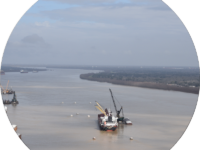Getting Down with Partnering Up
A port is only as good as its partners. Seaports depend on strong partnerships with a range of interests to capitalize on the opportunities and navigate the challenges that determine their short-term and long-term success.
By Tom Gresham

These days, a port is only as good as its partners. Seaports depend on strong partnerships with a range of interests such as businesses, governmental agencies, elected officials, trade associations, community organizations, labor organizations and local residents to capitalize on the opportunities and navigate the challenges that determine their short-term and long-term success.
“Relationships are key to success in any aspect of life, whether it’s personal or business,” said Sean Strawbridge, CEO of the Port of Corpus Christi.
David Thomas, acting executive director for the Maryland Port Administration, said partnerships are inherent to a port’s operation because of the myriad interests that are closely linked to ports and depend on them for their own prosperity. When forming a partnership, it is all about making the right connections with the right people at the right time. Sometimes, a networking event can lead to fruitful relationships, but other times it is about knowing when to reach out and to whom. However they are formed, partnerships “can pay dividends in many ways,” Thomas said.
In fact, partnerships not only can help drive profits and make operations more efficient, they also can help ports face down their most challenging obstacles – from catastrophic storms to global pandemics.
Partnering in a Crisis
The COVID-19 outbreak is the latest crisis to illustrate the importance of partnerships to ports. Mike Wilson, CEO of Consolidated Chassis Management, said seaports and their partners encounter unique challenges during any crisis that slows the movement of goods. In particular, he noted, ports are built to move cargo, not store it for the long term. Excess storage creates congestion and bottlenecks, slowing the supply chain that the country depends upon.
“When dealing with a crisis of such enormity, a collaborative, well-coordinated group of stakeholders is key,” Wilson said.
Thomas agreed that the role of partnerships moves to the forefront when a crisis strikes, and COVID-19 is no exception.
“It has never been more apparent how important it is to communicate regularly with our port partners, exchange best practices and ideas, and effectively present a united front to the public,” Thomas said.
Sometimes, partnerships can fray in the face of difficulties, and ports can find maintaining their obligations to their partners makes their work more challenging. However, sustainable partnerships only work if ports honor their commitments, “even in the toughest of times,” Strawbridge said.
“Nothing destabilizes a business more than unplanned events that disrupt supply chains,” Strawbridge said. “Force majeure events aside, making commitments and promises and then failing to meet those commitments and obligations is a recipe for a negative outcome every time.”



